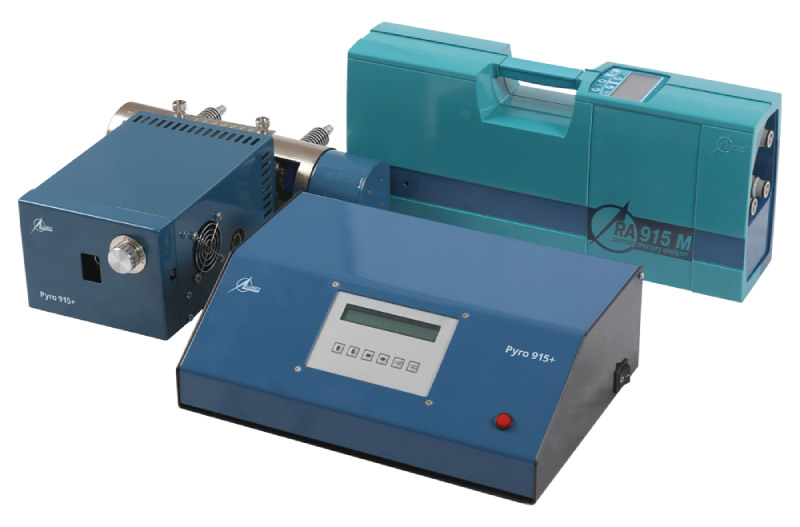Mercury Monitoring Toolkit
Mercury Monitoring Toolkit
Mercury Monitoring Toolkit is designed for efficient and cost-effective on-site determination of total and speciated mercury emissions with flue gases using sorbent trap method. The method has been widely used in power generation, cement production, metallurgy, waste incineration, etc.
Mercury Monitoring Toolkit
Mercury Monitoring Toolkit is designed for efficient and cost-effective on-site determination of total and speciated mercury emissions with flue gases using sorbent trap method. The method has been widely used in power generation, cement production, metallurgy, waste incineration, etc.
Sorbent Trap method is the most cost-effective and accurate method for measuring mercury content in flue gases that involves sampling using paired sorbent traps with subsequent laboratory analysis. The United Nations Environment Programme considers the sorbent trap method to be one of the BAT/BEP (best available techniques/best environmental practices) for mercury emissions monitoring.
The proposed technique complies with US EPA Method 30B; US EPA PS 12B; HJ 917-2017; CEN/TS 17286.
The so-called USEPA’s Mercury Measurement Toolkit was proposed by the US EPA to provide rapid, reliable on-site data on mercury levels in flue gas as well as in coal, ash and other combustion products.
Mercury Monitoring Toolkit includes:
- sampling system (heated probe and sampling console);
- variety of sorbent traps;
- analytical system based on direct Zeeman mercury analyzer.
A known volume of flue gas is sampled through paired in-stack sorbent traps at a fixed flow rate. After the sampling, the traps are removed and the sorbent sections are analyzed for mercury content.
- Compliant with US EPA Method 30B; PS 12B; HJ 917-2017; CEN/TS 17286
- Measurement of total Hg and speciation in flue gas
- Mobile equipment is easy to use, maintain, and transport
- No special requirements for site preparation
- Wide dynamic measurement range: 0.5 to 50 000 ng mercury absolute
- Fast on-site analyses (2–10 minutes per sample)
- No compressed gases
- Lower capital expenditure comparing to that of CEM
- Low operating and maintenance costs
- Versatility: analyses of coal, ash, sludge, wastewater with the same analytical system
Leaflets

The sampling system should comply with the selected standard and consist of at least the heated probe and sampling console.
Lumex Instruments offers the OLM30B sampling system for US EPA Method 30B implementation. OLM30B is a dual train, fully functional compact sampling system, complete with mass flow controllers, vacuum gauges, a temperature controller with thermocouple input and probe power port.
- RATA Sampling;
- CEM Performance Testing;
- Mercury Control Studies;
- Baseline Flue Gas Characterization Studies.
- US EPA Method 30B Compliant;
- Modular Design;
- Ease of Operation;
- Light weight and water resistant;
- Full Length Probe Heating & Cooling allows for speciation sampling.
 Mercury from the flue gas sample is collected at sorbent traps using a calibrated pumping system and heated sample probe. The material in these traps is later analyzed using Zeeman mercury analyzer.
Mercury from the flue gas sample is collected at sorbent traps using a calibrated pumping system and heated sample probe. The material in these traps is later analyzed using Zeeman mercury analyzer.
Sorbent traps of various configurations are specifically designed for short- and long-term sampling, for total mercury and mercury speciation (determination of oxidized and elemental mercury separately), etc. The sorbent traps have at least two sections: for the primary capture of gaseous mercury and for the mercury breakthrough. Sorbent traps can include an additional spiked section intended to confirm proper sampling and analysis.
More information on types and specifications of sorbent traps is available on request.
Lumex Instruments offers a following range of RA-915 series analyzers for measuring mercury emissions from stationary combustion sources: RA-915M combined with PYRO-915+ attachment, RA-915F (onsite and laboratory applications), or RA-915 Lab (laboratory routine analysis).
All models are based on Zeeman atomic absorption spectroscopy (ZAAS) and perform rapid selective mercury determination in any kind of solid and liquid samples.
THERMAL DECOMPOSITION TECHNIQUE
The sorbent from each section of the trap is placed and heated in the thermal decomposition chamber of the mercury analyzer. The mercury compounds are evaporated and dissociated forming elemental mercury. The gaseous products are transported into the analytical cell using ambient air as a carrier gas. Mercury atoms are then detected using ZAAS. This method does not involve intermediate preconcentration of mercury on a gold trap, thereby eliminating ensuing problems. Zeeman background correction provides the highest selectivity without interference from the sample matrix.
Automatic closed-loop temperature control extends measurement range and ensures no data loss during analysis. This is critical for long-term monitoring of flue gas emissions.
Detection limit: 0.5 ng; Range: 0.5 - 50,000 ng.




